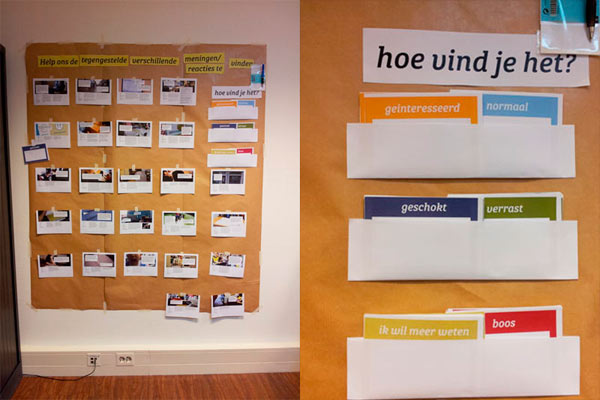Categories

“I am surprised, shocked… Are these what the women said about us?”
A social worker asked me this question as we sat in front of the Analysis Wall, one of the touchpoints from our Apeldoorn Starter Project, which we had put up a few days before. In front of us were quotes of different women we talked to, service providers we visited, and things we have heard from the social workers themselves. The content of the quotes was indeed confronting, offensive even, especially if you are a social worker trying to do your best to help women get on their own feet again after an abusive relationship. The quotes were confronting because they clearly showed that there are big gaps between what the women want versus what the services provide, and between what the women think help them versus what services think will help. They were confronting because they asked the fundamental question of “Why do we do what we do?”
The purpose of putting up the insights was not to play blame games or point the finger at certain individuals or organizations. Far from that. The wall was put up to involve our stakeholders – in this case the social workers – in the early process of analysis to integrate more debates into our process, as fodder for generating ideas. This is one way of testing hunch #7.
This Analysis Wall was actually our second take. We tried out an Analysis Wall and Debriefing Session with the social workers before Christmas, but we didn’t think it stirred real debate. There was only a limited amount of time available to hear individuals’ reactions to the insights because it was done in a large group. Additionally, we think the way the information is presented also plays a big part in sparking critical challenge and conversation.

So we iterated on the format of presenting the information: from a big chunk of factual information supported with a few quotes, to smaller pieces of information presented as quotes. We saw that information presented as quotes was much more powerful than factual information, because there was a sense of a first-person narrative. And then, we sat down with each social worker, one-on-one, to hear their reactions about what women, workers, and service providers said. The feedback we received was far more honest and reflective than we had heard before.
Moving on from the Analysis Wall, we want to create even bigger debates with our observations and findings. We want to set-up debates of what constitutes a good social work, what role the government plays in delivering what works and what does not work, and to poke the paradigm around what constitutes success. Because we don’t think it’s good enough to ‘help’ women just get by. We want to enable them to really flourish. So let the debating begin!